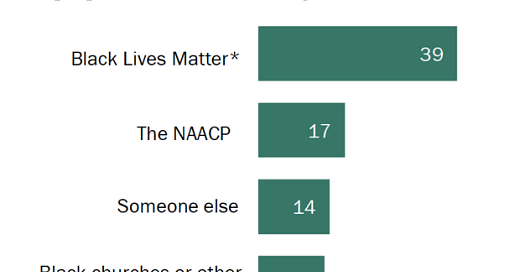Just 13 percent of Black people say the Black Church has been most helpful to Black people in recent years.
A recent survey reveals the how effective Black people think the church is right now.
In the penumbra of MLK Day and with Black History Month in the horizon, would you consider supporting this publication? Become a paid subscriber today!
I often get asked the question, “How do we fight racism?” In fact, that query comes up so often I write a whole book—How to Fight Racism—to address it.
But the conversation about how to promote racial justice continues to be a salient one. A recent report from Pew Research reveals which methods and strategies Black people think are most effective.
Voting and supporting Black-owned businesses top the list. Sixty-three percent of Black adults indicated that voting would be extremely effective or very effective at moving Black people toward equality. Fifty-eight percent said the same about supporting Black-owned businesses.
Volunteering, protesting, and contacting elected officials all made the list with 40 percent or more of respondents saying they would be effective at moving toward Black equality
There is a large discrepancy between Black Democrats and Black Republicans on what they think will work. For instance, 68 percent of Black Democrats and those who lean that way think voting is an effective tactic for Black uplift compared to 46 percent of Black Republicans and those who lean Republican.
How helpful is the Black church?
The data also reveal which organizations Black people think are doing the most to move toward racial equality.
By far, the Black survey respondents reported that Black Lives Matter “has done the most to help Black people in recent years.” At 39 percent, support for BLM as the most helpful is more than double the nearest choice, the NAACP at 17 percent. Support for BLM as the most helpful to Black people in recent years is triple the 13 percent of Black people who say the Black church has been most helpful.
A caveat to the data—the survey question “did not specify whether ‘Black Lives Matter’ was the name of an organization or a broader movement.
Saying that BLM has been the most helpful to Black equality in recent years could refer to the protests and activism done under the banner of BLM or to the organization itself which has chapters in dozens of cities. Or it could mean something else entirely in the mind of the survey respondent.
Whether people think of Black Lives Matter as an organization, a bigger movement, or something else, viewing the Black church as most helpful to Black people has little support.
Given the historic role of the Black church in freedom movements from slave rebellions, to abolition, to anti-lynching, to civil rights, current confidence in the Black church as an effective force for Black uplift is startlingly low.
Devout Black Christians and church leaders may take issue with the data, but “perception is reality.”
Whether the Black church has actually been effective in promoting Black equality in recent times, people believe the Black church has not been effective.
It would help to define what people mean by “Black church.” Is it Black Christians acting independently? Does it refer to individual Black churches and their actions as a congregation? Is the Black church a reference to historically Black denominations and their official actions on behalf of racial justice?
The new data about the helpfulness of Black churches in the pursuit of Black equality leaves more questions than it answers, but it does point to one acute challenge for Black Christians—how can the Black church be more effective in communicating its relevance to the current struggle for racial justice?
If this perception does not change then many will believe the Black church is simply no longer relevant to the Black freedom struggle.






When Dr. King came to Waterloo, IA, none of the Black churches were willing to host him—so a Presbyterian congregation on the wyt side of town hosted him: it has been said there was too much fear of repercussions, justified fear I would say.
I don’t think this was limited to Waterloo. I’m wondering how this has impacted how Black Churches engage today? How safe does it feel to name effective groups/individuals?
I also wonder about a certain ethos I’ve heard in Black churches that goes something like, “What’s going on outside these doors is wearying and troublesome, but we’re leaving that outside: these hours we will focus on worship and praise and thanksgiving that once again God saw fit to wake us up this morning…...”
Just thinking about it…. I recognize there are many layers of complexity, most of which are not fully accessible to me and some of which, not at all.
Do you believe that the results are applicable to the Deep South? Pew has an impeccable reputation but the results are jarring.